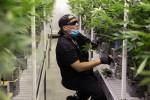EDITORIAL: What’s the hurry?
Nevadans voted last week to legalize recreational marijuana, approving Question 2 by a 54-46 margin. Perhaps the state’s foremost legalization proponent now urges bureaucrats to quickly set up the rules — all in the interests of quashing illegal activity, of course.
“If it’s going to be legal, we’re just forcing people into the black market if we don’t do this,” said Democratic state Sen. Tick Segerblom, aka Pol Pothead.
Earth to Sen. Segerblom: The notion that legal pot will bankrupt the corner dealer is utter nonsense. In fact, the opposite is more likely.
Under the proposal, which allows those who are 21 or older to possess and use up to an ounce of marijuana or grow up to six plants for personal consumption, the state Department of Transportation has until Jan. 1, 2018, to set up the regulatory apparatus governing cannabis stores. Under the law, only licensed medical marijuana outlets may receive state sanction to sell recreational pot during the first 18 months of the process.
Ultimately, the referendum allows for up to 80 pot retailers in Clark County, up to 20 in Washoe County and no more than two outlets in the state’s 16 rural counties. Watch for the powerful and well-connected to be favored during the application process.
“The sooner we can allow retail sales, the better the outcome for the community,” said Andrew Jolley, co-owner of a medicinal marijuana company, “and the faster the transition away from the black market to the regulated market.”
But that’s nonsense. The taxes and fees Nevada will impose on marijuana retailers — annual licenses will cost up to $30,000 and buyers faces a 15 percent excise levy on top of the sales tax — ensure that purchasing the drug on the street will be significantly cheaper than obtaining it from a legal outlet. And that means many smokers will prefer such an option.
This is not speculation — it’s simple economics.
Thriving black markets remain in Colorado and Washington, despite assurances to the contrary from legalization advocates. Tom Wainright of The Economist recently reported that illegal transactions still account for about 30 percent of all sales in Colorado and 70 percent in Washington. As Fransisco Gallardo, a Denver community leader, told The Atlantic magazine, “If it’s ridiculously expensive and they can get it from their homie cheaper, that’s what they’re going to do.”
Nevada’s tax rate is lower than the levies imposed in those states, so that might help minimize underground activity. But expect lawmakers looking to vacuum up as much revenue as possible to push the pot tax higher and higher, just as they do with the levies on cigarettes and alcohol.
There’s no need for state regulators and lawmakers to rush into anything, particularly under the false promise of quashing the black market. A thoughtful approach — which would include consulting those in other states that have already taken this leap — is far more likely to blunt the inevitable pitfalls likely to arise from legal weed.























